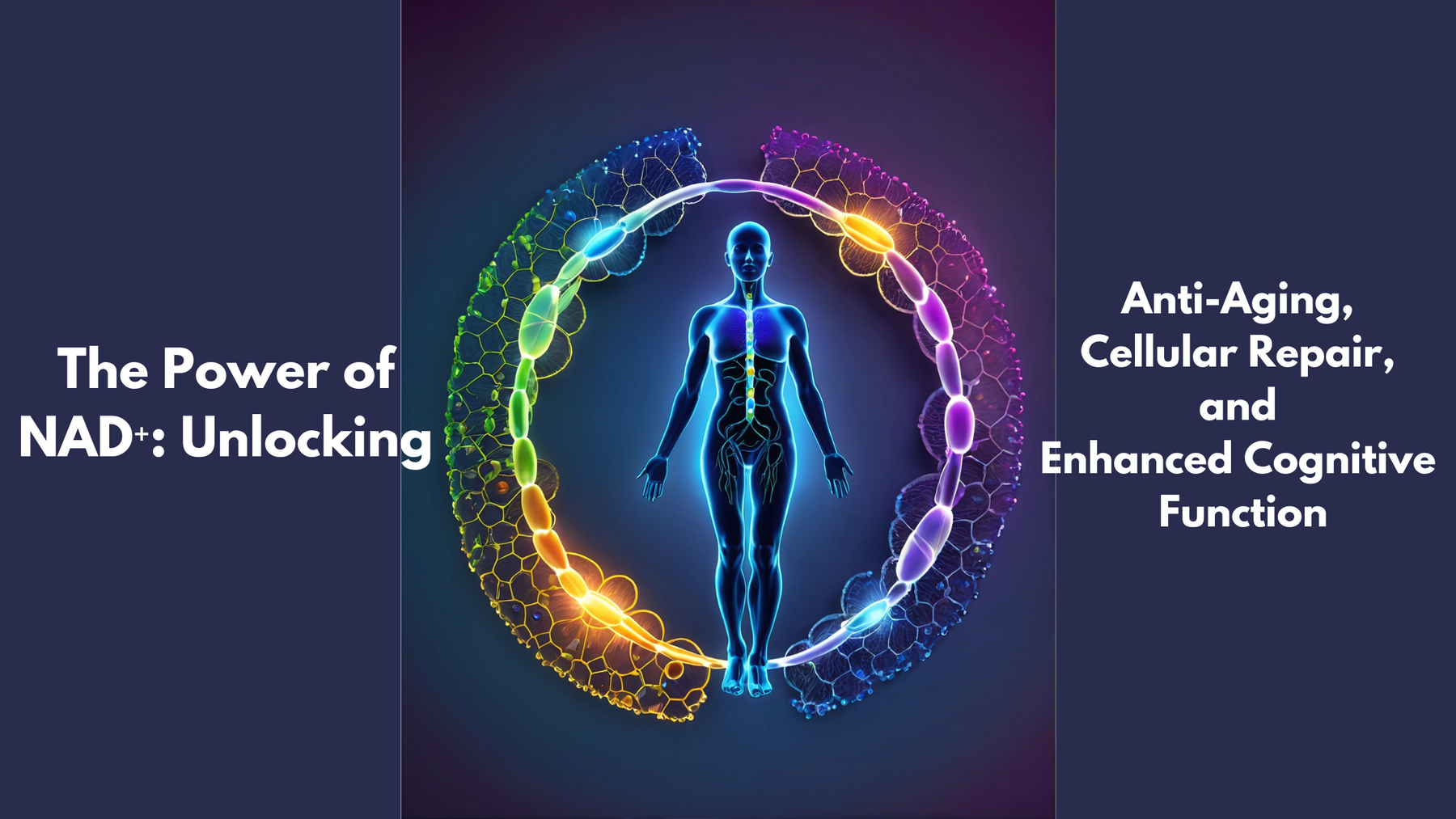
The Power of NAD⁺: Unlocking Anti-Aging, Cellular Repair, and Enhanced Cognitive Function
The Power of NAD⁺: Unlocking Anti-Aging, Cellular Repair, and Enhanced Cognitive Function
Aging is an inevitable part of life, but what if science could slow down its effects? Enter Nicotinamide Adenine Dinucleotide (NAD⁺), a coenzyme found in every living cell that's gaining attention for its potential to promote longevity, support cellular repair, and enhance cognitive function.
What Is NAD⁺?
NAD⁺ is a vital molecule involved in numerous metabolic processes. It plays a key role in converting nutrients into cellular energy, supporting DNA repair mechanisms, and regulating circadian rhythms. As we age, NAD⁺ levels naturally decline, leading to decreased cellular function and increased susceptibility to age-related diseases.
How Does NAD⁺ Work?
-
Energy Production: NAD⁺ facilitates the transfer of electrons in the mitochondria, the powerhouse of the cell, enabling the production of ATP—the primary energy currency of the body.
-
DNA Repair: It activates enzymes called PARPs that repair damaged DNA, maintaining genomic stability.
-
Sirtuin Activation: NAD⁺ is essential for the function of sirtuins, proteins that regulate cellular health and are linked to longevity.
Benefits of NAD⁺ Supplementation
-
Anti-Aging Effects: By boosting sirtuin activity, NAD⁺ helps delay cellular aging processes, promoting youthful function in cells (source).
-
Cellular Repair: Enhanced DNA repair mechanisms reduce the accumulation of mutations, potentially lowering the risk of age-related diseases (source).
-
Improved Cognitive Function: Increased NAD⁺ levels support neuronal health, leading to better memory, focus, and overall brain function (source).
Acute vs. Chronic Use
-
Acute Benefits: Short-term supplementation can lead to immediate improvements in energy levels and cognitive clarity due to enhanced mitochondrial function (source).
-
Chronic Benefits: Long-term use may contribute to sustained cellular health, reduced signs of aging, and a lower risk of neurodegenerative diseases (source).
Injectable vs. Ingestible NAD⁺: Bioavailability and Effectiveness
When it comes to NAD⁺ supplementation, the method of delivery can significantly impact its bioavailability and effectiveness. Understanding the differences between injectable and ingestible forms can help you make an informed decision.
Injectable NAD⁺
-
Higher Bioavailability: Injectable NAD⁺, administered intravenously or intramuscularly, bypasses the digestive system entirely. This direct entry into the bloodstream ensures maximum absorption and immediate availability to cells (source).
-
Immediate Effects: Users often report rapid improvements in energy levels, mental clarity, and mood due to the swift elevation of NAD⁺ levels in the body.
-
Professional Administration: Injections are typically administered by healthcare professionals, ensuring correct dosing and reducing the risk of side effects.
-
Cost and Accessibility: Injectable NAD⁺ treatments can be more expensive and less convenient due to the need for medical appointments.
Ingestible NAD⁺
-
Convenience: Oral supplements, such as capsules and tablets containing NAD⁺ precursors like Nicotinamide Riboside (NR) or Nicotinamide Mononucleotide (NMN), are easy to incorporate into daily routines.
-
Gradual Absorption: The digestive process means that NAD⁺ is absorbed more slowly, leading to a steadier increase in levels over time.
-
Variable Bioavailability: Some NAD⁺ is lost during digestion due to enzymatic breakdown and first-pass metabolism in the liver, potentially reducing the overall effectiveness compared to injectable forms (source).
-
Cost-Effective: Generally more affordable and accessible, making them suitable for long-term use.
Bioavailability Comparison
-
Injectables: Offer nearly 100% bioavailability since they enter the bloodstream directly.
-
Ingestibles: Bioavailability can vary but is typically lower due to digestive processes. Some studies suggest that certain precursors can effectively raise NAD⁺ levels despite this limitation (source).
Effectiveness in Achieving Health Goals
-
Immediate Needs: If rapid restoration of NAD⁺ levels is desired, such as in acute energy deficits or recovery scenarios, injectables may be more effective.
-
Long-Term Maintenance: For ongoing support of NAD⁺ levels, oral supplements provide a practical and sustainable option.
Incorporating NAD⁺ Into Your Wellness Routine
Recommended Dosage and Schedule
-
Injectable NAD⁺: Dosages can vary widely based on individual needs and medical advice. Treatments may involve higher doses administered less frequently. Consult a healthcare professional for personalized guidance.
-
Ingestible NAD⁺: Common dosages range from 250 mg to 500 mg daily of NAD⁺ precursors. Starting with a lower dose and adjusting as needed is advisable (source).
Consult a Healthcare Professional
Before starting any NAD⁺ supplementation, discuss it with a healthcare provider to determine the most suitable form and dosage for your specific health goals and conditions.
Why You Should Consider NAD⁺
Incorporating NAD⁺ into your health regimen offers a multifaceted approach to aging gracefully. By supporting cellular energy production, enhancing DNA repair, and boosting brain function, NAD⁺ serves as a cornerstone for overall well-being.
Conclusion
The decline of NAD⁺ with age opens the door to various health challenges. Supplementation—whether injectable or ingestible—offers a promising avenue to mitigate these effects. By understanding the differences in bioavailability and effectiveness, you can choose the method that best aligns with your health objectives and lifestyle.
Unlock the potential of NAD⁺ and take a proactive step towards enhanced vitality and longevity.
References:
-
Verdin, E. (2015). NAD⁺ in aging, metabolism, and neurodegeneration. Science, 350(6265), 1208-1213.
-
Yoshino, J., Baur, J. A., & Imai, S. I. (2018). NAD⁺ intermediates: The biology and therapeutic potential of NMN and NR. Cell Metabolism, 27(3), 513-528.
-
Sinclair, D. A., & Guarente, L. (2014). Small-molecule allosteric activators of sirtuins. Annual Review of Pharmacology and Toxicology, 54, 363-380.
Keywords: NAD⁺, Nicotinamide Adenine Dinucleotide, Anti-Aging, Cellular Repair, Cognitive Function, Injectable NAD⁺, Ingestible NAD⁺, Bioavailability, Sirtuins, Mitochondria

Leave a comment